
|
Foreign
Correspondent (1940)
In Alfred Hitchcock's intriguing political thriller
set just before the outbreak of war on the Continent - it was an
espionage tale that endorsed the US entrance into the war effort;
the film closely resembled his earlier British spy thrillers: The
39 Steps (1935, UK) and The Lady Vanishes (1938, UK),
although more attuned for US audiences. The film was best remembered for a
number of memorable scenes or set-pieces.
It was nominated for six Oscars, but didn't receive a single Academy
Award.
The main protagonist was a hard-headed,
but relatively inexperienced American crime reporter and foreign
correspondent caught in the political turmoil of Europe just before
the outbreak of World War II (in the late summer of 1939). He became
embroiled in the duplicitous activities of an international peace
organization operating as a traitorous, subversive Nazi spy ring. There
were three basic settings in the film: New York, London, and Amsterdam.
The film's MacGuffin
was Clause 27 in the draft of a secret peace treaty between Holland
and Belgium, memorized by a Dutch diplomat, one of only two signatories
of the treaty. As a result of his knowledge, the Dutch "strongman" was
kidnapped after a faked assassination attempt by a secret spy organization,
and the film revolved around trying to locate and save the diplomat,
who was allegedly the key to maintaining peace in Europe in 1939.
- the film's opening scrolling prologue was dedicated
to "foreign correspondents"
- in the NYC offices of the New York Morning Globe on
August 19, 1939, Mr. Powers (Harry Davenport), the Globe's editor-in-chief
was upset over the unsatisfactory reports being received from Mr.
Stebbins (Robert Benchley), his foreign correspondent in London;
tough and often insubordinate NY crime reporter Johnny Jones (Joel
McCrea) was chosen to be sent to Europe to report on the crisis
as a true news reporter; he was assigned to interview leading Dutch
statesman and Peace Movement leader and diplomat Mr. Van Meer
- the "keynote" to understanding
the European situation
- before leaving NY, Jones met with one of the Globe's
urbane contributors - the head of the Universal Peace Party - a suave Stephen Fisher (Herbert
Marshall) who was one of Van Meer's supporters and close confidantes;
it was suggested that Jones change his name to a pen name - the
posh-sounding Huntley Haverstock; Jones took the Cunard Lines' Queen
Mary on his voyage to London; at the Victoria train station, he met his predecessor
Stebbins (a Globe reporter for 25 years), and during a drink in
a nearby bar, Stebbins admitted that he was slack in his reporting,
and was an alcoholic (and later was found to be a womanizer)
- the next day in London on August 26, 1939, Jones
was prepared to attend a Savoy Hotel luncheon (sponsored by the
Universal Peace Party) to obtain an exclusive interview with the
speaker, famous diplomat Van Meer; to his surprise after leaving
his hotel (the Carlton), he found himself sharing a taxi ride to
the event with Van Meer (Albert Bassermann) himself; during the
short trip, Van Meer avoided most of Jones' questions about politics
and the impending war in Poland
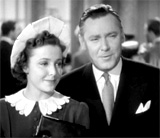
Stephen Fisher With His Daughter Carol (Laraine Day) at Van
Meer's Luncheon Lecture
|
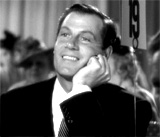
|
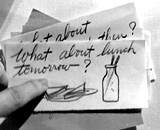
|
|
Jones' Infatuation with Carol Seated at the Head
Table During the Luncheon - He Sent Her Love
Notes Asking For a Date
|
- at the Savoy Hotel while awaiting the luncheon's
lecture, Jones mingled with other international guests, including
Stephen Fisher and his lovely, feisty and idealistic US/Brit. daughter
Carol (Laraine Day), but Jones made some insulting comments and
the Peace Party that offended her; at the head table, Fisher was
seated with his daughter; during the meal, Jones kept sending over
a dozen flirtatious love notes (asking for a date) to Carol; he
had quickly developed a strong romantic attraction toward
her, but she was not interested
- Stephen Fisher made an unexpected announcement that
the luncheon's guest of honor, Dutch diplomat Van Meer, couldn't
attend and had sent a telegram to notify the gathering of his absence;
and then he introduced his "publicist" daughter
as the substitute speaker; during her talk, she debunked Jones'
comment to her earlier that the Peace Party members were only "well-meaning
amateurs"
- Jones was notified by his boss Mr. Powers by cable
that his next compulsory assignment was to travel to Amsterdam
to attend a Peace Conference and again establish contact
with Van Meer; he was notified to: "EXPECT
IMPORTANT SPEECH AFFECTING EUROPEAN WAR"
- in Amsterdam at the city's grand Town Hall, onlookers,
police and photographers (including Fisher and Jones) were on the
top landing of the Town Hall's stairs awaiting Van Meer's arrival
by limousine in the public square below; Fisher happened to mention
to Jones that he was doubtful and concerned about worsening peace
prospects (they were "under the shadow of war"), and was leaving to return to London later
in the day
- in one of the film's spectacular set-pieces - during
an assassination attempt in Amsterdam, as Van Meer (Samuel Adams,
Van Meer's impersonator) was mounting the steep stairs in the rain,
Jones rushed down to greet Van Meer, but the elderly gentleman
strangely failed to recognize him; Van Meer was shot in the middle
of his forehead by a photographer-assassin (Charles Wagenheim)
with a gun; from a high vantage point, a sea of bobbing black umbrellas
revealed the escape route of the assassin; at the bottom of the
steps, the gunman also shot a policeman dead and a bicyclist (when
aiming at Jones)

|
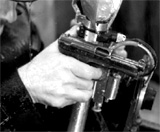
|

|

|

|

|
|
Reporter Jones and Photographer-Assassin
with Diplomat Van Meer (actually an Imposter!) Who Was Shot Dead
on the Steps in Amsterdam
|
- Jones chased the assassin through the streets, dodging
more bullets; when Jones was thrown off the black getaway car, he
then hopped into another parked vehicle, and demanded that the
driver, newspaper-man reporter Scott Ffolliott (George Sanders)
(pronounced "with a double f...both small f's"), follow the gunman's escaping
car; he was surprised that the driver's passenger was Carol Fisher;
as the pursuit moved into the countryside with large Dutch windmills
visible on the roadsides, the assassin shot back at them; many cars
were involved in the chase including the two main vehicles, and a
squadron of police cars and motorcycles
- amidst one of the windmills (the set included
the sounds of the wind in the sails and the wooden gears), the
getaway car suddenly disappeared; the police vehicles proceeded
onward, while Ffolliott's car stopped; Jones happened to notice
that the windmill had stopped revolving normally
(counter clock-wise) and had begun to turn in the opposite direction
(clockwise, the wrong way, mysteriously against the wind); his hypothesis
ws that the windmill was a signal of some kind; after sending Ffolliott
and Carol onward to summon the police to return, he noticed an
airplane circling above to land nearby; inside the windmill, he
discovered the getaway car inside, and upstairs, three men were
negotiating (in a foreign language) regarding a payoff of the assassin,
and he saw two other men approaching from the plane; it appeared
to be a hideout for Nazi spies
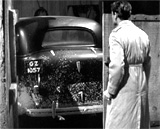
The Getaway Car Found Inside the Windmill
|
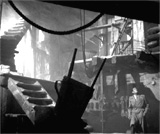
Also Inside the Windmill - a Hideout for Nazi Spies
|

Jones Spoke with The Real Kidnapped Van Meer Held
Inside the Windmill
|
- in a store-room, Jones found an alive Van Meer (the
real one) seated and mumbling mostly incoherently after having
been drugged with a sedative; Jones was astounded that Van Meer
was alive; the Dutch diplomat confirmed that his death had been
faked with an imposter look-alike, decoy or doppelganger,
and that he had been kidnapped and held hostage by some unknown
organization; Jones was forced to hide and evade them when the
villains took Van Meer away in the airplane; there was a tense
moment when Jones' trenchcoat became enmeshed in the rotating
cogs of the windmill, and he was forced to strip off his coat to
avoid being sucked into the gears
- by the time the police arrived, there was no trace
of the conspirators or the getaway car, and no one believed him
when asserted: "They've gone....That car was here"; he realized he had been set
up and was unwittingly embroiled in the troubling situation, but
vowed to investigate: ("There's a big story in this. I can
smell it, I can feel it, and I'm gonna get to the bottom of it
if it's the last thing I do. Nothing's gonna stop me. Do
you understand? I'm gonna prove that that wasn't Van Meer that
was assassinated, but his double")
- later in his Amsterdam Hotel Europe room that night,
Jones typed a telegram to his Globe office: ("DON'T WORRY
ABOUT DELAY AM HOT ON TRAIL OF BIGGEST STORY OF CENTURY NO KIDDING
DON'T SEND OUT ANYTHING MORE OF VAN MEER'S ASSASSINATION HAVE TERRIFIC
NEWS BEAT ALL READY TO BREAK
REPEAT NO KIDDING")
- he was interrupted
by two suspicious armed men claiming to be a detective and a policeman;
after viewing their nefarious plans for him through the bathroom
door keyhole, he climbed out of his bathroom window to evade them,
made his way along a ledge on the outside of the building, and
entered into another hotel room's suite, where a party or reception
was being hosted by Carol and the Peace Organization; after she
berated him, he defended his actions and how he had stumbled into "some
international dirty business" and was being targeted because
he knew that Van Meer was alive; but everything sounded incredulous
to Carol and detrimental to her peace work with her father: ("All
you're interested in is having fun with windmills and hotel bathrooms");
Jones was steadfast: "I don't know the ins and outs of your
crackpot peace movement, and I don't know what's wrong with Europe.
But I do know a story when I see one. And I'll keep after it until
either I get it or it gets me"
- Carol reluctantly agreed to help him, with
a smile ("Don't go!"); by creating a commotion in his hotel
room, Jones was able to get a change of clothes, and
escape from the hotel with Carol; on their way out, the intruders
did spot them, but were unable to pursue them; Carol and Johnny boarded "the
night boat to England," and were forced to spend the night on
the cold deck of the ship during a storm, huddled together under
blankets; inexplicably and suddenly, Johnny proposed marriage: ("I
love you, and I want to marry you")
and Carol promptly accepted by repeating his line, without any resistance
or argument
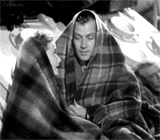
|
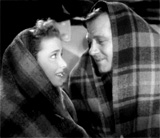
|
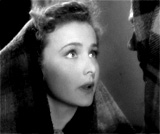
A Marriage Proposal to Carol
|
|
On the Cold Deck of a "Night
Boat to England"
|
- in England, the two went to Carol's father's house,
where Jones recognized Mr. Krug (Eduardo Ciannelli), one of the
men from the windmill, having breakfast with Stephen; Stephen introduced
him as a member of the Baruvian Embassy staff in London; in private,
Jones warned Stephen about what really happened to Van Meer in
Amsterdam: "Van Meer isn't
dead....That was his double that was shot. Van Meer himself was
kidnapped. I talked to him in a mill outside Amsterdam"; behind
closed doors without Jones' knowledge, it became obvious that Stephen
was one of the co-conspirator gang members - he worriedly shared
Jones' recent discoveries with Krug; Krug proposed an idea to rid
them of Jones' interference -- they would suggest his protection
by hiring a bodyguard or "private
detective" named Rowley (Edmund Gwenn) - actually, Rowley was
a retired contract killer-assassin
- although Stephen advised that Jones keep his breaking
news story quiet, in order to prevent any further harm to Van Meer,
Jones objected to Fisher's suggestion: ("Keep it quiet?! A famous
diplomat's kidnapped right under my own eyes and I muzzle myself?
I'm sorry, Mr. Fisher, but this is a story with facts in it. This
is the kind of story I was sent over here to get. This is the kind
America's waiting for"), but he agreed to wait a few hours until
there were more developments; Jones also accepted Fisher's
offer of contacting "a very efficient private detective agency" and
arranging to provide a bodyguard to watch out for him
|
Attempts of Contract Killer Rowley
(Edmund Gwenn) to Murder Jones
|
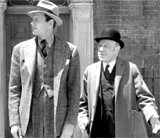
Attempt to Push Jones Into Path of Truck
|

Attempt to Push Jones Off the Cathedral Bell Tower
|
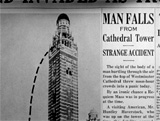
Victim was Rowley
|
- during a suspenseful and tense set of sequences,
it appeared that Rowley was repeatedly trying to kill Jones; Rowley
deliberately pushed Jones into the path of an oncoming truck; and
then on the observation deck of the tall tower of Westminster Catholic
Cathedral, as Jones leaned over, contract killer Rowley backed
up a few feet to take a running leap at him; the camera switched
to a POV of Rowley's hands rushing at the camera - and the screams
of a woman on the street below; a body fell through the air from
the top of the tower - it was would-be-murderer Rowley's body that
fell to the pavement; it was now confirmed for Jones that Fisher
was involved with the conspirators
- in the Fleet Street offices of the newspaper, Jones
refused to publish his side of the story until Van Meer was found
safe; Ffolliott proposed ways to "catch Fisher"
and "find Van Meer" - and suggested that they pretend to
kidnap Fisher's daughter Carol to force Fisher to divulge Van Meer's
location; to proceed with the plan, Jones and Carol retreated out
of London to Cambridge, but due to a misunderstanding about an overnight
stay, she promptly disappeared (and drove back to London), clearly
insulted or distressed
- back in London, Stephen Fisher was
suddenly making plans to leave for the US the following day on the
"Clipper"; Ffolliott's blackmailing scheme to make it look
like Carol was kidnapped failed when she reappeared at his home,
and Stephen convinced her to join him
- before leaving, Fisher visited Van Meer in a 4th
floor room above a closed restaurant on Charlotte Street where
he was being held; the disoriented Van Meer was being tortured
by two gang member thugs - under bright Photoflood Lamps while
loud music was broadcast from a phonograph record player - to divulge
the information (the secret clause 27) that the organization wanted;
Van Meer refused to whisper the secret to Fisher, and accused him
of being a traitor and a liar: ("You cry peace, Fisher. Peace.
And there was no peace. Only war and death. You're a liar, Fisher");
Jones arrived with Stebbins, but Fisher and his bodyguards had
escaped, leaving Van Meer behind, who was then taken to the Hilton
Nursing Home for medical care
- in the meantime, England and France had declared
war on Germany in early September of 1939; without
any way to stop Fisher, Ffolliott suggested that they follow Fisher
by booking two tickets on the same plane to America - a Trans-oceanic
Airways four-propeller plane
- during their 14-hour Trans-atlantic trip, Fisher
was seated in first-class with his daughter Carol; Jones and Ffolliott
were in the rear of the plane in the economy section; a
transmitted RADIOGRAM message for Ffolliott was intercepted during
its delivery by Fisher, who read disturbing news that had been found
out after Van Meer's confession - he knew he would be apprehended:
("Van Meer conscious. Has provided all necessary evidence. Steps have been
taken to meet plane other side"); Fisher
felt compelled to confess to his daughter Carol the truth of his
nefarious activities, and how he would be arrested and taken back
to London upon their arrival; she had already intuited and suspected
that he was a duplicitous spy
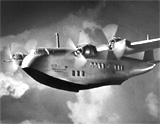
|
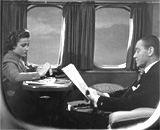
|
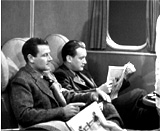
|
|
Trans-Atlantic Plane With Fisher and
Carol in First Class - Plus Jones and Ffolliott in the Rear of
the Plane
|
- on the plane, Jones felt compelled to speak to Carol,
not as much about her father but about their confused and complex
relationship; she responded with multiple claims and accusations,
that he didn't really love her, and that he had only been pursuing
her to capture her father: "Everything you've ever said to
me have been lies"; he replied that he was only doing his job as a reporter
- in a spectacular sequence (a convincing
Trans-atlantic plane crash disaster), the plane was hit
by German gunfire from a warship; the wings of the plane shredded
as it lost altitude; the crash itself was seen from the cockpit's
POV, over the shoulder of the pilots; the plane dramatically
smashed into the surface of the rough seas, and water rushed into
the cabin through the sides of the damaged plane; the few survivors
clung to the plane's fuselage and crowded wing
|
Realistic Trans-Atlantic Plane Crash - Cockpit
POV of Crash; Survivors Clung to the Fuselage
|
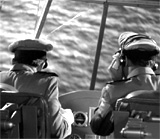
|
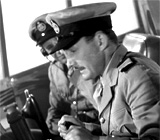
|
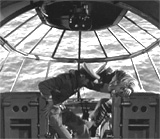
|
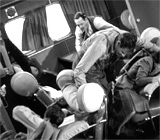
|
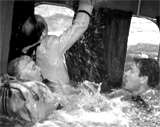
|
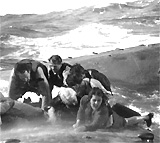
|
- to prevent any more deaths, villainous Fisher heroically
attempted to save others from the stormy and turbulent seas by
sacrificing himself - he removed his life jacket and swam off into
the rough waters to perish; a small group of less than a dozen
survivors were rescued by an American ship, the Mohican,
that appeared on the horizon, spotted in the pilot's binoculars
- on the rescue ship bound for London, Jones and Ffolliott
were not allowed to radio their news-story from the ship to
the press while in "enemy waters"; Jones
was still concerned about his weakened relationship with Carol, and
vowed not to betray her father; however, she urged Johnny to not
sugar-coat her father's involvement with a spy ring, and instead
dutifully report the truth
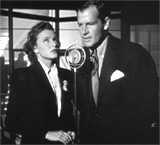
|
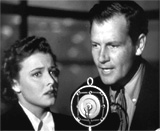
|
|
Jones' Concluding Radio Appeal in London
|
- in the film's conclusion set in a London radio studio,
Jones was introduced before a radio broadcast by an announcer (John
Burton), with Carol nearby to his side; his final,
provocative radio appeal (a tacked-on propagandistic ending) from London
begged the American public to end its neutral stance and enter the
war, as bombs fell on the darkened radio studio: ("All
that noise you hear isn't static - it's death coming to London. Yes,
they're coming here now. You can hear the bombs falling on the streets
and the homes. Don't tune me out. Hang on awhile. This is a big story
and you're part of it. It's too late to do anything here now except
stand in the dark and let them come. It's as if the lights were all
out everywhere, except in America. Keep those lights burning there!
Cover them with steel! Ring them with guns! Build a canopy of battleships
and bombing planes around them! Hello, America! Hang on to your lights.
They're the only lights left in the world")
- a chorus of The Star Spangled Banner ended
the film, with the cast credits scrolling upward
|
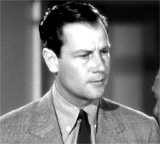
New York Morning Globe Reporter Johnny Jones (Joel
McCrea) - aka Huntley Haverstock
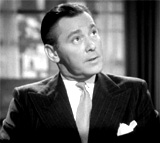
Universal Peace Party Leader Stephen Fisher (Herbert Marshall)
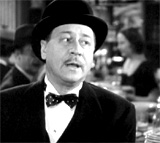
London Reporter Stebbins (Robert Benchley) - to be Replaced by Jones
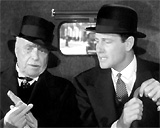
Jones' Shared London Taxi-Ride with Luncheon Speaker Van
Meer (Albert Bassermann)
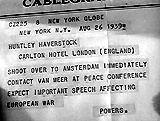
Jones Directed by Cable to Travel to Amsterdam to Meet Up with Van Meer
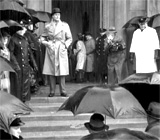
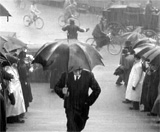
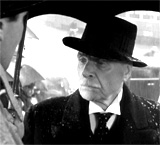
Jones Awaiting Van Meer on the Steps Who Didn't
Recognize Him
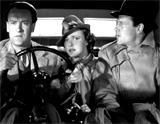
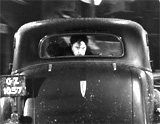
Jones Pursuing the Black Getaway Car, in a Vehicle with Carol
and Driver-Reporter Scott Ffolliott (George Sanders)

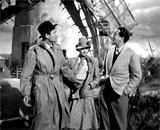
Windmill Area Where the Assassin Fled
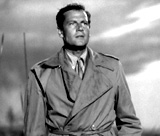
Jones Noticing Strange Movements of the Windmill and an Airplane
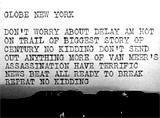
Jones' Cable to the Globe in New York
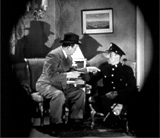
Two Suspicious Men in Jones' Hotel Room - Viewed Through Bathroom
Door Keyhole
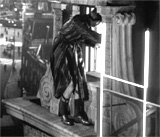
Jones On a Ledge on the Outside of His Hotel Building
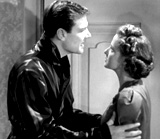
At Carol's Peace Organization Party, Jones Begging For Her Help
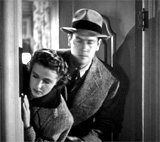
Jones Evading Capture at the Hotel with Carol
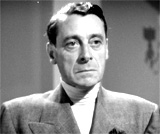
Stephen Fisher's Co-Conspirator Mr. Krug (Eduardo Ciannelli)
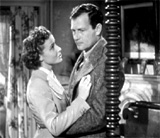
Jones and Carol Retreating Out of London to Cambridge - A Failed
Plan to Pretend to Kidnap Her and Force Her Father to Divulge
Van Meer's Whereabouts
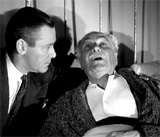
Fisher Visiting With Van Meer Before Fleeing From England
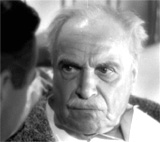

Van Meer - Kidnapped and Tortured - But Refusing to Reveal the Secret
Clause 27
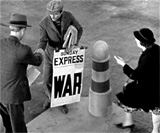
War Declared on Germany - Early September 1939
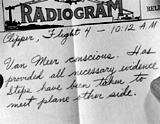
Radiogram For Ffolliott Intercepted by Fisher on Plane
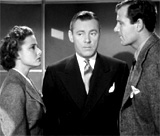
Jones Trying to Clear Things Up with Carol
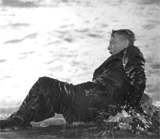
Fisher's Self-Sacrifice
|




























